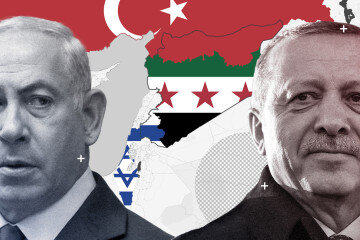Beirut – In Syria, the struggle between regional and international power is raging. Ankara is one of the forces seeking to strengthen its hegemony in Syria. This puts Turkey in conflict with Tel Aviv. This views Turkish policies as a direct threat to their interests.
Over the past few weeks, Israeli occupational entities have resumed attacks on Syria with the aim of destroying all Syrian Army facilities, including Hama, Palmyra, Dumaire and Homs.
If the goal was to prevent Syria from maintaining military capabilities that can be used now or in the future, it would have achieved this after the dramatic collapse of the Bashar al-Assad government and would not have attracted these sites to this day.
Without a doubt, there are technical and logistical reasons behind this delay. However, according to a confession from an official in the Zionist regime, the main reason is to prevent Turkey from using these military bases, particularly air force bases.
Although Turkish foreign policy focuses primarily on the Transatlantic Alliance, occupying entities are concerned about the presence of Turkish military units in central or northern Syria, as they limit air interventions in Syria.
A senior Israeli official told Maarib that by strengthening its military and political presence in northern Syria, Ankara “sought to permanently integrate its impact.”
Israel believes that Turkish military presence in Syria will have a major impact on Syrian authority on Ankara, reinforcing the influence that existed from the beginning of Bashar al-Assad’s war with the government to the success of Al Jorany taking control of Syria.
Turkey has warned against Israeli intervention in Syria and has taken steps, including integrating military entities, even in central Syria. There, the intention is to establish permanent military bases and deploy weapons and intercept systems that limit freedom of maneuvering in Syria’s airspace – fragmentary and intercept systems as security guards as Israel’s source of security.
As for Al Jorani, Israel sees him as an integral part of Turkish tools to expand his influence in Syria. This is why some Israeli officials described him as “the leader of terrorist organizations.”
This allows, of course, professional bodies to continue their expansionist strategy in southern Syria without paying attention to the encouraging message they receive from al-Jollani, calling for finding a “solution” that takes into account Israel’s interests.
More importantly, Washington is trying to establish a balance between the allies of two competing regions. Ankara is supporting attempts to expand northern Syria and a significant portion of the Centre into the Kurdish region. At the same time, it considers Tel Aviv’s benefits to the south to ensure Syria’s fragmentation.
Therefore, Washington is currently happy to make sure that neither side can control Syria completely or monopolize the decision-making process. No initiative was needed to lift Syria’s sanctions. Rather, it declared the new regime “terrorists” in line with Israel’s approach.
With an unspoken message to stop Turkish ambitions, Washington signaled Moscow that there was no problem with maintaining military presence in Syria. It also emphasized support for Kurdish people.
Overall, it is difficult to bet on the US position, which often combines contradictions, but it may give Ankara and Tel Aviv a great opportunity to integrate influence.
Meanwhile, Turkish Foreign Minister Hakan Fidan told Reuters that Israeli attacks could deepen regional instability in Syria, and that Syria’s willingness to enter into specific agreements with Israel is purely an internal Syrian issue.

